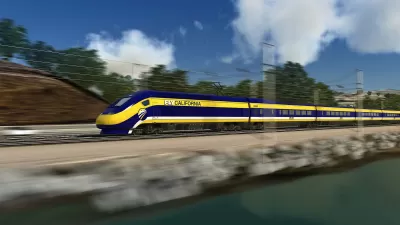Both sides have been awaiting this ruling, which left Gov. Jerry Brown and the High Speed Rail Authority greatly pleased: the appeals court ruling releases $9.9 billion of 2008 voter-approved bond funding, though other court battles loom.
Gov. Brown had appealed the Sacramento Superior Court's two November rulings that "the state must create a new funding plan for the [$68 billion] project and prevented the state from selling $9 billion in rail bonds to fund the project," wrote past Planetizen editor Jonathan Nettler.
On July 31, a panel of three justices of the 3rd District Court of Appeal in Sacramento unanimously "ordered Sacramento County Superior Court Judge Michael Kenny to OK the issuance of bonds from Proposition 1A, the $9.9 billion high-speed rail bond measure approved by California voters in 2008," writes The Fresno Bee's Tim Sheehan.
"We welcome the court's ruling," rail authority board chairman Dan Richard said in a written statement Thursday evening. "The high-speed rail authority has always been committed to building a modern high-speed rail system that will connect the state, precisely as the voters called for when they passed Proposition 1A."
Stuart Flashman, an Oakland attorney representing (Kings County farmer John) Tos, (Hanford resident Aaron) Fukuda and Kings County in their lawsuit against the rail agency, said he was "obviously disappointed" by the justices' decision.
The appeals court panel decision "now sets the stage for a possible state Supreme Court challenge, though an attorney for the project's opponents said Thursday night that his clients had not decided yet whether to seek an appeal," writes Jessica Calefati of the Bay Area News Group.
Sheehan added that the court "said it sees other looming legal questions for high-speed rail -- most raised in lawsuits by Kings County plaintiffs.
The appeals court said that "substantial legal questions loom in the trial court as to whether the high-speed rail project the California High-Speed Rail Authority seeks to build is the project approved by voters in 2008." Those questions are at the heart of the second part of the Tos/Fukuda/Kings County lawsuit, which is expected to be heard by Kenny late this year.
But, the justices added, "contrary to the trial court's determination, the High-Speed Passenger Train Finance Committee properly found that issuance of the bonds for the project was necessary or desirable."
Last week the High Speed Rail Authority won another appeals court ruling which the San Francisco Chronicle editorialized on July 28.
"A state appeals court has blessed environmental studies needed to run the bullet train through the Pacheco Pass connecting the Bay Area and Central Valley," they wrote about the July 24th decision to uphold the Superior Court's decision last year that dismissed a CEQA lawsuit from Peninsula cities fighting the route.
The appeals court win strikes close to home. The cities of Atherton and Palo Alto dislike high-speed rail, fearing the noise, construction and trouble it may bring along tracks running through the communities. They pushed for lengthier reviews of the Pacheco train route to delay the project.
I might as well squeeze in one more high speed rail litigation update. Sheehan writes on June 23 that yet another lawsuit has been filed by rail opponents - this one based on what they claim to be unlawful use of cap and trade revenue for the train. Will it ever end?
FULL STORY: Appeals court approves bond sale for high-speed rail

Planetizen Federal Action Tracker
A weekly monitor of how Trump’s orders and actions are impacting planners and planning in America.

Maui's Vacation Rental Debate Turns Ugly
Verbal attacks, misinformation campaigns and fistfights plague a high-stakes debate to convert thousands of vacation rentals into long-term housing.

San Francisco Suspends Traffic Calming Amidst Record Deaths
Citing “a challenging fiscal landscape,” the city will cease the program on the heels of 42 traffic deaths, including 24 pedestrians.

Amtrak Rolls Out New Orleans to Alabama “Mardi Gras” Train
The new service will operate morning and evening departures between Mobile and New Orleans.

The Subversive Car-Free Guide to Trump's Great American Road Trip
Car-free ways to access Chicagoland’s best tourist attractions.

San Antonio and Austin are Fusing Into one Massive Megaregion
The region spanning the two central Texas cities is growing fast, posing challenges for local infrastructure and water supplies.
Urban Design for Planners 1: Software Tools
This six-course series explores essential urban design concepts using open source software and equips planners with the tools they need to participate fully in the urban design process.
Planning for Universal Design
Learn the tools for implementing Universal Design in planning regulations.
Heyer Gruel & Associates PA
JM Goldson LLC
Custer County Colorado
City of Camden Redevelopment Agency
City of Astoria
Transportation Research & Education Center (TREC) at Portland State University
Jefferson Parish Government
Camden Redevelopment Agency
City of Claremont



























